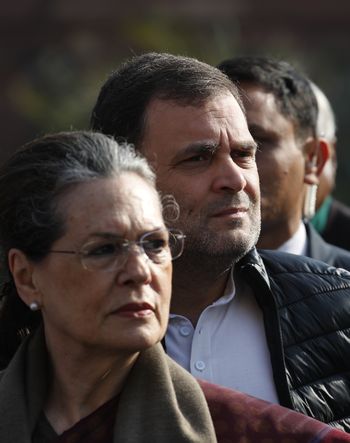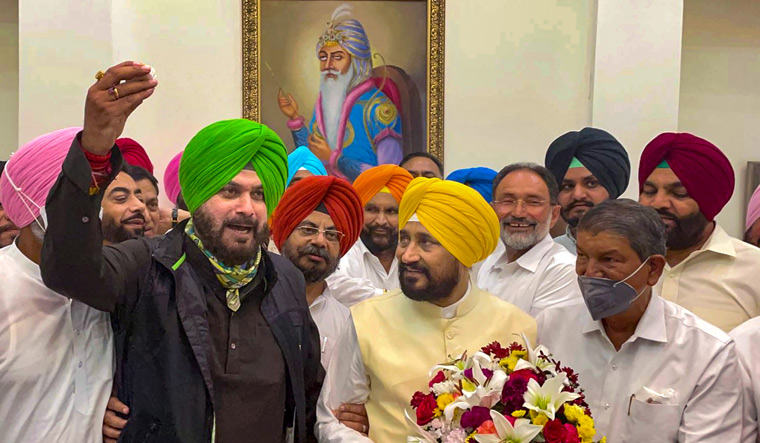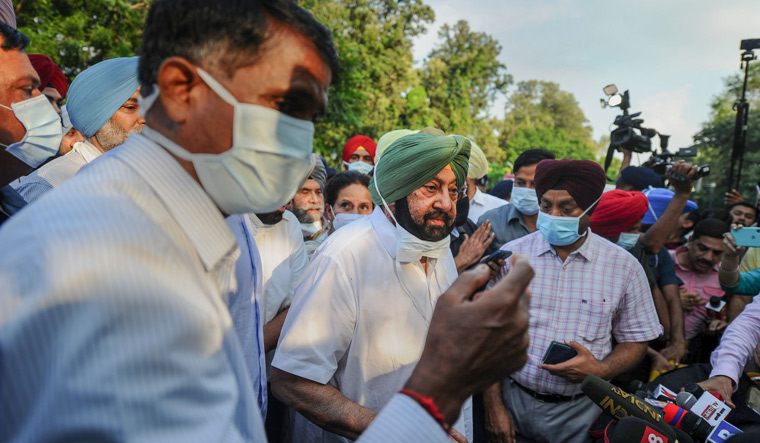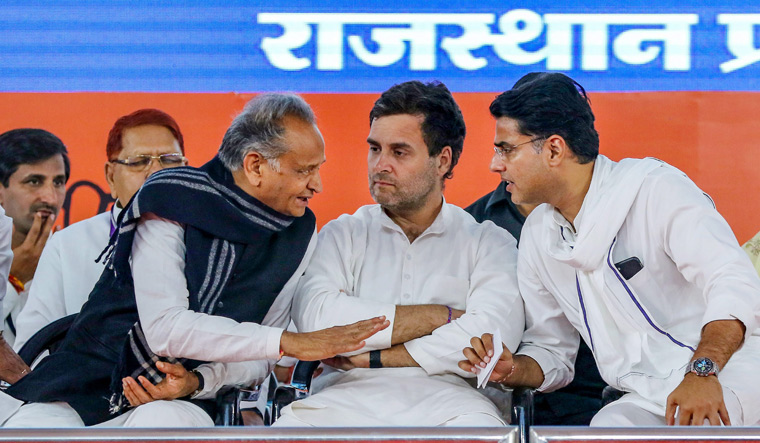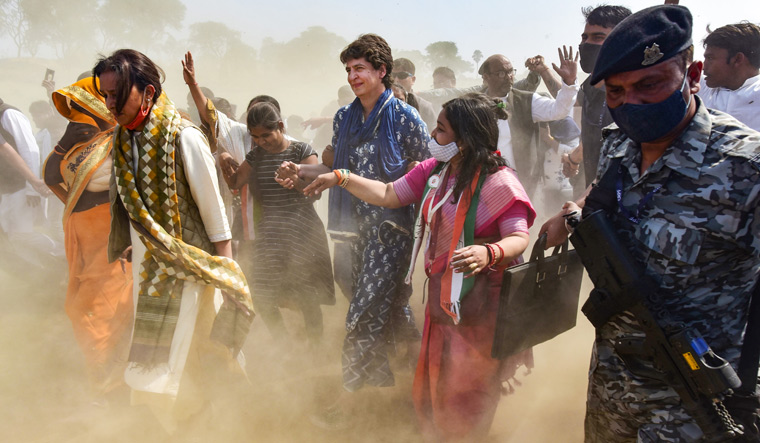Amarinder Singh, by all means, was the captain of Punjab politics. The Patiala Maharaja ruled the state as he pleased and dealt with the Congress’s central leadership nonchalantly. At a personal level, he enjoyed access to the Gandhi family that very few in the party could match. Rajiv Gandhi was a childhood friend, and he is on a first-name basis with Congress president Sonia Gandhi. Rahul Gandhi and Priyanka Gandhi Vadra call him “uncle”.
But on September 18, the formidable regional satrap was asked by the party leadership to resign as chief minister. The sudden turn of events also marked an assertion by the Gandhis of their authority. They had been facing questions about their leadership, style of functioning and vote-catching ability. For good measure, the royal and imperious Amarinder was replaced by a dalit Sikh leader with humble origins.
What happened in Punjab showed that the primacy of decision-making in the Congress now lies with Rahul and Priyanka. There was a shift from the status-quoist and consensus-building approach of Sonia. On display was a decisiveness that has otherwise been seen in the way the Bharatiya Janata Party replaced a few of its chief ministers recently.
If Operation Punjab had the imprint of Rahul writ large, Priyanka played a key role in mainstreaming Amarinder's bete noire, Navjot Singh Sidhu. Rahul got deeply involved in the imbroglio when Sidhu went all out against Amarinder, and several legislators and ministers voiced their discontent with the government.
The change in Amarinder's fortunes might look sudden, but it was a long time coming. He seemed sitting pretty earlier this year, as the Akalis and the BJP parted ways over the farm laws and the Aam Aadmi Party was in disarray. But the captain failed to sense the rising discontent on the ground, alienated his MLAs and pre-empted his detractors by naming himself the chief minister face for the assembly elections.
The wheel of fortune turned in April when the Punjab and Haryana High Court rejected the report of the state government-constituted special investigation team's probe into the sacrilege issue. A series of incidents of desecration of the Guru Granth Sahib in 2015 is still an emotive issue in the state, and Amarinder had vowed to punish the culprits. All hell broke loose, with Sidhu and some ministers—who were formerly Amarinder's supporters—openly criticising him. Many other problems also tumbled out, such as the continuing drug menace and the faulty power purchase agreements. He was also perceived as being in cahoots with the Badals. The anger against the Amarinder regime and the anti-incumbency against MLAs meant that the legislators were keen on a change at the helm. They knew that Amarinder could not help them cross the finish line this time.
Following the waves of rebellion, Amarinder was virtually put on notice by the high command. When a letter signed by some 60 legislators reached Delhi, Rahul took charge of the final act. The midnight tweet by Congress general secretary Harish Rawat, who is in charge of Punjab, about a legislature party being convened the following day was the clearest indication that Amarinder's time was up.
Rahul sent his trusted general secretary, Ajay Maken, to Chandigarh to ensure that the operation was swift and clean. A day earlier, he had a meeting with Maken and the party's legal eagle Abhishek Manu Singhvi to chalk up a backup plan if Amarinder dissolved the assembly. The advice was that a letter signed by 60 MLAs would counter any such move.
In the end, Amarinder gave up. He stood deserted. His anger and pain over the ruthlessness with which he was ousted were evident as he spoke about the humiliation. He called Sonia to express his anguish. She merely said, “Sorry, Amarinder.”
Rahul's stamp on the change of guard was confirmed when he attended the swearing-in ceremony of Charanjit Singh Channi, the first dalit chief minister of the state. His elevation would help the party get a substantial chunk of dalit votes, which is about 32 per cent of the electorate—the highest in the country. The Congress had lost a sizable chunk of its share of dalit votes to the AAP in the last election.
Channi's appointment is being described as a masterstroke. Though driven by the compulsions of internal politics, it has immense symbolic value. “The Congress has pre-empted the other parties, which were promising a dalit chief minister or a dalit deputy chief minister. They will now have to redraw their strategy,” said Punjab Congress leader Raj Kumar Verka.
There have been questions asked about whether the leadership could have handled the Amarinder exit more delicately. However, with Amarinder not being very responsive to its directives for changing the way his government functioned, the high command was left with no other option. It is also being asked if the party will recover from the bitter wrangling over the past few months. “The manner in which Amarinder was removed makes it clear that there is no future for him in the party. He has few options, and the party knows that. But it has to be wary about the damage that he can inflict on the party by indirectly supporting rivals. Also, Channi is no pushover. If he performs well, he might frustrate Sidhu,” said political scientist Harjeshwar Pal Singh. Amarinder has already declared that he will pit a strong candidate against Sidhu, a clear indication that he is leaving the party.
The Gandhis seem to be seeking to convey the message that the high command is supreme at a time when the 'Group of 23' dissenters have been questioning their decisions and calling for substantive changes in the party. Rahul's intervention in Punjab, however, strengthened rebels' argument—that he has been wielding influence without holding any post.
Meanwhile, the central leadership's assertiveness is being contrasted with its inability to get the Kamal Nath-Digvijaya Singh duo in Madhya Pradesh to make room for Jyotiraditya Scindia. A desperate Scindia left the Congress last year and joined the BJP, leading to the collapse of the Congress government in the state.
There is speculation that the newfound firmness of the leadership would result in changes in the other two Congress-ruled states, Rajasthan and Chhattisgarh. Chief Ministers Ashok Gehlot and Bhupesh Baghel are facing infighting and have resisted the high command's interventions to effect change.
In Rajasthan, there is renewed hope in the Sachin Pilot camp that Gehlot will finally fall in line and carry out the much-delayed cabinet expansion and political appointments to accommodate Pilot’s supporters. A little more than a year ago, Pilot's rebellion against Gehlot was quelled by the high command with the promise of a better share of power, but there has been no forward movement on the promises. Several dates mentioned by Maken, who is in charge of party affairs in the state, have passed. The latest explanation for the delay offered by him is the heart procedure Gehlot underwent recently.
Around the time the Punjab moves were being finalised in Delhi, Pilot had a long meeting with Rahul after several months. It is rumoured that the focus of the central leadership will now turn to Rajasthan. “There is the expectation that the party high command will get Gehlot to make the necessary changes,” said Rajendra Chaudhary, vice president, Rajasthan Congress. “Gehlot knows he cannot defy the central leadership beyond a point. No chief minister is bigger than the party high command.”
Like Amarinder, Gehlot is heavily dependent on the bureaucracy and the government is unresponsive to the legislators' pleas, say his critics. Their original demand for a leadership change in the state could rear its head again. A crucial difference between Punjab and Rajasthan, however, is that Gehlot proved last year that a majority of the MLAs were with him.
In Chhattisgarh, there is a renewed discussion on the fate of Baghel. His rival T.S. Singh Deo’s claim is that there was an understanding in 2018, when the party won the assembly election, that there would be a rotational chief ministership. The plan was that Singh Deo would replace Baghel in the latter half of the tenure. Apparently, Rahul almost decided that the understanding reached in 2018 should be respected when Singh Deo and Baghel were summoned to Delhi a month ago.
However, unlike in Punjab, there is no breakdown of communication between the party high command and the chief minister in Chhattisgarh. Also, while Amarinder did not enjoy the support of MLAs, about 90 per cent of the legislators in Chhattisgarh are with the chief minister, said a Baghel supporter. “All the MLAs and the government in Chhattisgarh have been working under the leadership of Rahul Gandhi ji and as per the guidance of the party high command,” said Bhilai MLA Devendra Yadav.
However, a leader close to Baghel said the chief minister knew it was not going to be smooth sailing for him. “There will be ups and downs. When the MLAs went to Delhi to express solidarity with him, it did look like he would be replaced. But he survived. There were factors that worked in his favour. Priyanka ji's intervention was also crucial,” he said.
What worked in Baghel's favour was his image as an OBC leader and the resources at his disposal. Many assembly elections are around the corner and he is expected to play an important role, especially in Uttar Pradesh.
While the high command's assertiveness has put the Congress chief ministers on alert, the central leadership has to share the blame for the similar stories of infighting repeating in every state. Either its inaction has let the differences fester, or its intervention has made matters worse.
While Rawat was busy in Punjab, the situation in his home state, Uttarakhand, had gone from bad to worse. Fierce infighting is harming the party's poll prospects and the AAP is snapping at its heels. Pritam Singh, who was recently replaced as state Congress chief by Rawat's confidant Ganesh Godiyal, feels he has been short-changed and every meeting of the state unit is a slanging match between the supporters of Rawat and Singh.
In Kerala, where the party high command dismantled the power-sharing structure represented by the Oommen Chandy and Ramesh Chennithala camps, the change in the state leadership has left many aggrieved. It is argued that while the two camps might have bred nepotism and shut out talent, they helped the party reach out to various social groups. But a change was inevitable after the drubbing in the assembly elections earlier this year. “After the shocking defeat in the assembly elections, a course correction was needed. Whenever a transition takes place, there is bound to be some disturbance. It is quite normal,” said Hibi Eden, MP.
The doughty D.K. Shivakumar, whom Rahul handpicked for the post of president in Karnataka, has had many run-ins with former chief minister Siddaramaiah. Both nurse chief ministerial ambitions. In Haryana, the belligerent Jat leader Bhupinder Hooda, who is not on the best of terms with Rahul, has been forcefully demanding that the reins of the party in the state be given to him.
On the other hand, the Congress state unit in Gujarat, which will have elections in late 2022, has been waiting for an organisational revamp. After the death of Rajiv Satav earlier this year, it has been without an AICC in-charge. The wait for the appointment of a new state chief and a legislative party leader also continues. The general perception is that the party has frittered away the benefits of the tough fight that it gave to the BJP in 2017. There has been an exodus of leaders ever since. And an ambitious AAP is making things tougher.
“Rahul Gandhi has given an assurance that after Punjab and the changes being made in the states that go to polls, it will be the turn of Gujarat to put in place a team that is a combination of the young and old,” said Hardik Patel, working president of the party in Gujarat.
In Uttar Pradesh, where Priyanka is the general secretary in charge, a similar tale of discontentment among leaders is evident. Unhappy with a new team put in place by Priyanka, several leaders have left the already depleted state unit. “We cannot stop people from leaving the party if they are doing so for selfish reasons,” said state Congress leader Akhilesh Pratap Singh. “It is the time to rebuild the party rather than rush to greener pastures, giving up on your own rich political legacy.”
The Gandhis are learnt to be keen on getting election strategist Prashant Kishor on board and his plans for reviving the party ahead of the Lok Sabha elections in 2024 have been discussed with senior leaders. A section of the senior leadership, including those in the G23, has expressed reservations about the move to give Kishor a prominent position. The 'PK' effect, however, was evident in the changes in Punjab.
Kishor was Amarinder's strategist in the last assembly elections and had been brought on board for the upcoming one as well. However, it is learnt that Kishor's inputs played a role in Sidhu's appointment as state Congress chief, and with the former cricketer emerging as the face of the party for the state polls, the poll pundit parted ways with Amarinder.
Beyond Punjab, Kishor has presented to the Congress leadership a set of proposals on organisational changes and inputs on how the party can be revamped and made election-ready for 2024. Among his suggestions is setting up an empowered group of leaders to decide on the party's election strategy and management, and strengthening the state and district committees. Meanwhile, even as Kishor waits for the party to decide on inducting him, he has been meeting party leaders and discussing his ideas with him. There is also speculation that he could be involved in revitalising the demoralised state unit in Gujarat ahead of the assembly elections.
There is unease with the manner in which Rahul and Priyanka have been going about taking crucial decisions. In-house critics say they are running roughshod over other leaders in the attempt to assert their supremacy. “Leaders who have served the party for decades cannot be relegated to the sidelines, and upstarts who have no foundation in the party act as key advisers of Rahul and Priyanka and have a role in the decision-making,” said a G23 leader.
In a move that is learnt to have been facilitated by Kishor and Hardik Patel, the Congress could soon induct former student leader Kanhaiya Kumar and prominent dalit activist Jignesh Mevani, both strident voices against Modi, into the party soon. “All young leaders who believe in the Congress ideology and are determined to fight the divisive ideology of the BJP and the RSS are welcome to join the party,” said Patel.
Rahul's critics, however, say the move might end up as an optical illusion if the leadership issue continues to be unresolved and the party does not come up with a compelling narrative and makes substantive changes in the organisation. More importantly, the Congress has to win elections. It could, however, be a tall task even in Punjab, where there are indications that the AAP could have already capitalised on the confusion in the Congress and the disenchantment against its government.
The Congress high command’s Punjab bravado was spectacular, but it has not answered the existential questions that the party and the Gandhis face.


